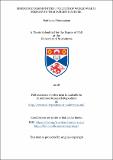Files in this item
Mnemonic communities : politics of World War II memory in Thai screen culture
Item metadata
| dc.contributor.advisor | Iordanova, Dina | |
| dc.contributor.advisor | Burgoyne, Robert | |
| dc.contributor.author | Prasannam, Natthanai | |
| dc.coverage.spatial | x, 310 p. | en_US |
| dc.date.accessioned | 2017-12-04T15:46:32Z | |
| dc.date.available | 2017-12-04T15:46:32Z | |
| dc.date.issued | 2018-06-28 | |
| dc.identifier.uri | https://hdl.handle.net/10023/12247 | |
| dc.description.abstract | This thesis examines the politics of World War II memory in Thai screen culture with special reference to films and television series produced between the 1970s and the 2010s. Framed by memory studies and film studies approaches, the thesis hopes to answer 1) how WW II memory on screen is related to other memory texts: monuments, museums and commemorative rituals and 2) how the memory is coded by various genres: romance, biopic, combat film and horror. The project relies on a plurimedial network which has not yet been extensively studied by film scholars in Thailand. Through the lens of memory studies, the on-screen memory is profoundly intermingled with other sites of memory across Thailand and beyond. It potentially is counter-memory and vernacular memory challenging the state’s official memory. The politics of WWII memory are also engaged with cultural politics in Thailand in terms of class, gender and ethnicity. The politics of commoners and trauma are given more voice in WWII memory compared to other moments of the national past, which are dominated by the royal-nationalism. From film studies perspectives, the genres mediating WWII memory are shaped by traditions of Thai-Thai and transnational screen culture; the Thai WWII combat film is a newly proposed genre. The thesis also explores directors, the star system, exhibition and reception. The findings should prove that WWII memory on Thai screen serves their roles in memory institutions which construct and maintain mnemonic communities as well as the roles in entertainment and media institutions. Another crucial implication of the research is that politicising WWII memory on the Thai screen can illuminate how memory and visual texts travel. The research likewise manifests its contributions to a better understanding of how Thai screen culture can be positioned within both global memory culture and global screen culture. | en_US |
| dc.description.sponsorship | "I am keen to acknowledge scholarships and grants from the University of St Andrews, the Empowering Network for International Thai & ASEAN Studies (ENITAS) of Chulalongkorn University, the Faculty of Humanities at Kasetsart University and Thailand’s Film Archive (Public Organisation)." -- Acknowledgements | en |
| dc.language.iso | en | en_US |
| dc.publisher | University of St Andrews | |
| dc.subject | Thai cinema | en_US |
| dc.subject | Cultural memory | en_US |
| dc.subject | World War II | en_US |
| dc.subject | Thai television | en_US |
| dc.subject.lcc | D743.23P8 | |
| dc.subject.lcsh | Motion pictures--Thailand | en |
| dc.subject.lcsh | Television series--Thailand | en |
| dc.subject.lcsh | World War, 1939-1945--Motion pictures and the war | en |
| dc.title | Mnemonic communities : politics of World War II memory in Thai screen culture | en_US |
| dc.type | Thesis | en_US |
| dc.contributor.sponsor | University of St Andrews | en_US |
| dc.contributor.sponsor | Čhulālongkō̜nmahāwitthayālai. Empowering Network for International thai & ASEAN Studies (ENITAS) | en_US |
| dc.contributor.sponsor | Mahāwitthayālai Kasētsāt. Faculty of Humanities | en_US |
| dc.contributor.sponsor | Hō̜phāpphayon hǣng Chāt (Thailand) | en_US |
| dc.type.qualificationlevel | Doctoral | en_US |
| dc.type.qualificationname | PhD Doctor of Philosophy | en_US |
| dc.publisher.institution | The University of St Andrews | en_US |
| dc.identifier.doi | https://doi.org/10.17630/10023-12247 |
This item appears in the following Collection(s)
Items in the St Andrews Research Repository are protected by copyright, with all rights reserved, unless otherwise indicated.

